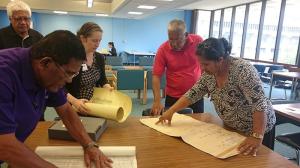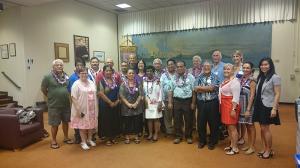Law School offers training to Pacific Island judges
University of Hawaiʻi at MānoaThe William S. Richardson School of Law again hosted 16 Pacific Island judges, offering an intensive week of legal training, this year about Constitutional Law.
The program is part of the Pacific islands Legal Institute administered by the Ninth Circuit Pacific Islands Committee. The Committee, chaired by Senior District Judge Consuelo Marshall, awarded the Richardson Law School a multi-year contract to teach about the rule of law to judges in former and current U.S. Territories in the Pacific. The week of instruction alternates between Pacific Island locations and Hawai’i.
The judges who attend are prominent members of their communities, but they do not necessarily have law degrees.
The week-long session, which began Monday, July 20, and ended Friday, July 24, was funded by the U.S. Department of the Interior to enhance the rule of law across the Pacific. Judges attending the session came from Palau, American Samoa, the Federated States of Micronesia and the Marshall Islands.
Dean Avi Soifer said it is particularly appropriate that the Richardson Law School can provide legal training for the Pacific island judges.
Soifer explained, “This actually was a key element in the founding vision shared by Chief Justice Richardson and his allies, who fought to make sure that Hawai‘i had its own law school to serve the entire Pacific region. We have been committed ever since to educating people from these and other islands, and many of our graduates return to their homes to serve their communities.”
Soifer added, “It is a real treat for us to learn from these judges. With major assistance from the Law School’s Director of Special Projects Minara Mordecai, I think they also have learned a lot and they have been helped to feel comfortable in our community.”
The judges themselves lauded the Law School’s participation in their ongoing understanding of legal nuances. “This is a very, very important program because the judges have little training in law,” said Judge Aliitai Lilio from American Samoa.
“This training, especially in constitutional law, is important to our field of work,” continued Lilio, who has served as a judge for five years and is a former director of veterans affairs for the government of American Samoa. “It broadens our view. The law changes every day and there are always challenges that arise and this reminds us not only about the U.S. Constitution but also the constitutions of our own islands.”
For Judge Mayceleen Anson of Pohnpei in Micronesia, formerly staff counsel in her state legislature, the training at Richardson has deepened her legal understanding. “All these cases (we study) help me see broader aspects,” said Anson who graduated from UH-Hilo in clinical psychology in 1985, but grew up in a rural area of Pohnpei without electricity or TV.
“Everything I learn I’m putting into use,” said Anson. Although she has completed two years of Trial Counselor training and passed the bar back home, Anson said “this training is really helpful.”
Attorney Julian Aguon ’09, who heads the new Pacific-based law firm Blue Ocean Law based in Hagatna, Guam, assisted with the program, reflecting on and focusing discussion. “These people are lay judges and on a daily basis their work is grappling with tensions in the law,” said Aguon. “It’s great Richardson is stepping up and being a partner because it has an important role as an American law school. Their (the judges’) entire constitutions are patterned after U.S. law so it’s important they understand it. Being U.S.-affiliated countries, it’s so important for the Law School to equip them in this way.”
As project director, Mordecai said the program is designed to provide a logical progression in the judges’ legal training. “This is such an important way for the Law School to give back to the broader Pacific community,” she noted. “This program strengthens our already strong Pacific connections. To see the judges’ progress, understanding and engagement has really been fulfilling.”
Along with intensive legal training offered to the judges by Richardson Law School faculty and other academic experts, the judges heard from Federal Magistrate Judge Barry Kurren, Federal District Court Judge Michael Seabright, and Federal Ninth Circuit Court of Appeals Judge Richard Clifton, all of whom have experience serving as judges on Pacific islands.
The Pacific island judges also visited the Bishop Museum and were able to utilize the University of Hawai‘i’s extensive collection of Pacific island materials at the Law School and Hamilton libraries, considered to be the best such collection in the world.
Judge Milton Zackios, from the Marshall Islands, said he is already looking forward to the next training. “No question about it! I’ll be here,” he said. “I’ve learned a lot.”


